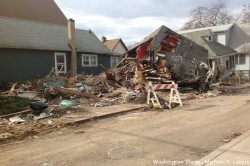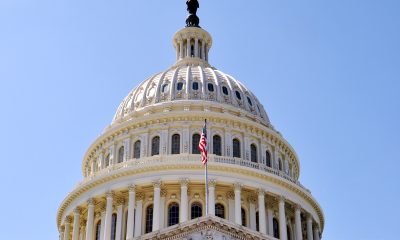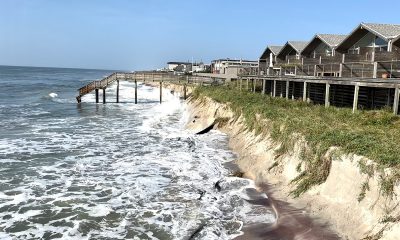National
Fire Island continues post-Sandy recovery
Gay business owners prepare for new season after storm
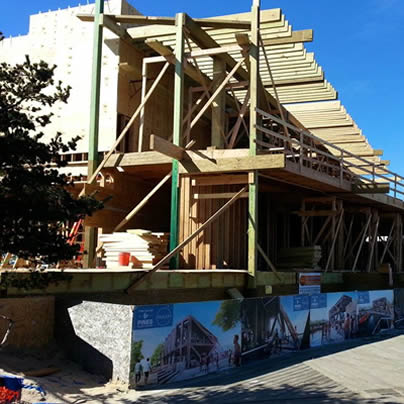
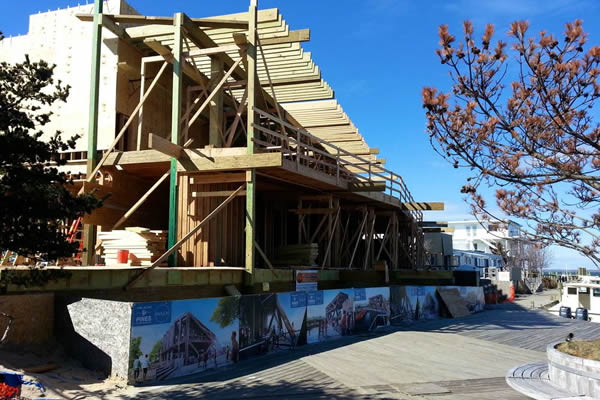
Crews continue to reconstruct the Pavilion nightclub in Fire Island Pines, N.Y., after a Nov. 2011 fire destroyed it. (Photo courtesy of FIP Ventures)
More than four months after Superstorm Sandy devastated the New York and New Jersey coastline, residents and business owners on Fire Island continue to prepare for the upcoming season.
Diane Romano, president of the Cherry Grove Community Association, told the Washington Blade on Tuesday the beachfront dunes that had been damaged during Sandy have begun to rebuild because of dune fencing the hamlet installed immediately after the storm.
The storm surge that reached nearly 14 feet in parts of New York City and Long Island flooded dozens of bay front homes, damaged a number of boardwalks and destroyed beach accesses. In spite of this damage, Romano stressed Cherry Grove weathered Sandy relatively well compared to other Fire Island communities.
“The people of Cherry Grove seem to be thankful and looking forward to a great season,” she said.
Jay Pagano, president of the Fire Island Pines Property Owners Association, said “necessary repairs” to the harbor are underway. He said the resort’s marina will be “up and running” by April 15, and debris removal will be completed by the end of this month.
Construction on the Pavilion, a nightclub that burned to the ground during a November 2011 fire that destroyed several other businesses in the Fire Island Pines commercial district, continues. It is slated to open later this spring in time to commemorate the gay resort’s 60th anniversary.
“The new Pines Pavilion complies to a heightened [Federal Emergency Management Agency] sea level, and none of the crucial elements of the building were touched by water,” Matthias Hollwich of Hollwich Kushner Architects, which designed the building, said. “Thankfully the foundations are deep and strong enough to easily withstand Sandy. The only challenge that we experienced was a delay in construction.”
The storm washed several oceanfront homes in Davis Park, a hamlet that is roughly two miles east of Fire Island Pines, out to sea. Dozens of others along the 34-mile long barrier island east of New York City also suffered damage.
The surge also caused numerous overwashes and at least three breaches — including one on the eastern end of Fire Island through which water continues to flow between the ocean and the Great South Bay.
The debris removal process had been delayed because of controversy over the bidding process through which the U.S. Army Corps of Engineers awarded the contract. The National Park Service’s announcement last month that it would begin to enforce a state law on some Fire Island beaches that bans public nudity, in part because Sandy destroyed the dunes that had obstructed nude sunbathers, sparked outrage among some. It does not, however, apply to Fire Island Pines or Cherry Grove.
‘We’re still kind of homeless’
Gay Staten Island residents with whom the Blade spoke roughly a month after Sandy made landfall continue to struggle to recover from the storm.
Up to six feet of water inundated Wayne Steinman and Sal Iacullo’s oceanfront townhouse on Father Capodanno Boulevard in the borough’s Midland Beach neighborhood during Sandy. The couple continues to live with Ianullo’s parents in Brooklyn as they try to repair their home.
Contractors have replaced the condominium’s back and side walls. A new furnace and hot water heater have been installed, but Steinman said he cannot begin the bulk of the needed structural repairs until he receives a payout from his insurance company.
“It’s really very, very frustrating,” Steinman said. “We’re still kind of homeless.”
Allison Galdorisi and Claire Watson fled their home in the Cedar Grove neighborhood of Staten Island during the height of the storm as several feet of water inundated the area.
Galdorisi told the Blade on Wednesday she and her wife “cleaned and dried the house out really quickly,” but the couple continues to rent an apartment in Midland Beach. The women are considering lifting their home to meet new FEMA flood standards, or even accepting a buyout that would take more than a year to complete.
“We’re just stuck,” Galdorisi said. “We’re pretty much out of shock and going into this new shock of not knowing what’s the best thing to do.”
Staten Island resident Michele Karlsberg, who is lesbian comedian Kate Clinton’s publicist, coordinated volunteer efforts in the borough in the weeks after Sandy.
She said her mother will move back into her apartment in the borough’s Ocean Breeze neighborhood that had eight feet of water inside it after the storm on March 15. Karlsberg added her sister has spent $30,000 so far to repair her home.
“The zone looks the same as if it was day one,” she said.
Sandy also inundated the Ali Forney Center’s drop-in center for homeless LGBT youth near the Hudson River in Manhattan’s West Chelsea neighborhood.
Gay MSNBC anchor Thomas Roberts and his husband, Patrick Abner, were among those who helped the organization raise funds to recoup some of their losses and to help pay for some of the renovations to a second drop-in center that opened in Harlem less than two months after the storm. The new facility does not yet have showers or medical facilities for the 60 young people who access it each day, but Ali Forney Center Executive Director Carl Siciliano stressed he feels his organization has recovered well from the storm.
“Because of that really strong support, we were able to pretty quickly get back on our feet,” he said.
State Department
State Department releases annual human rights report
Antony Blinken reiterates criticism of Uganda’s Anti-Homosexuality Act

Secretary of State Antony Blinken on Monday once again reiterated his criticism of Uganda’s Anti-Homosexuality Act upon release of the State Department’s annual human rights report.
“This year’s report also captures human rights abuses against members of vulnerable communities,” he told reporters. “In Afghanistan, the Taliban have limited work opportunities for women, shuttered institutions found educating girls, and increasing floggings for women and men accused of, quote, ‘immoral behavior,’ end quote. Uganda passed a draconian and discriminatory Anti-Homosexuality Act, threatening LGBTQI+ individuals with life imprisonment, even death, simply for being with the person they loved.”
Ugandan President Yoweri Museveni last May signed the law, which contains a death penalty provision for “aggravated homosexuality.”
The U.S. subsequently imposed visa restrictions on Ugandan officials and removed the country from a program that allows sub-Saharan African countries to trade duty-free with the U.S. The World Bank Group also announced the suspension of new loans to Uganda.
Uganda’s Constitutional Court earlier this month refused to “nullify the Anti-Homosexuality Act in its totality.” More than a dozen Ugandan LGBTQ activists have appealed the ruling.
Clare Byarugaba of Chapter Four Uganda, a Ugandan LGBTQ rights group, on Monday met with National Security Council Chief-of-Staff Curtis Ried. Jay Gilliam, the senior LGBTQI+ coordinator for the U.S. Agency for International Development, in February traveled to Uganda and met with LGBTQ activists who discussed the Anti-Homosexuality Act’s impact.
“LGBTQI+ activists reported police arrested numerous individuals on the basis of their sexual orientation or gender identity and subjected many to forced anal exams, a medically discredited practice with no evidentiary value that was considered a form of cruel, inhuman, and degrading treatment and could amount to torture,” reads the human rights report.
The report, among other things, also notes Ugandan human rights activists “reported numerous instances of state and non-state actor violence and harassment against LGBTQI+ persons and noted authorities did not adequately investigate the cases.”
Report highlights anti-LGBTQ crackdowns in Ghana, Hungary, Russia
Ghanaian lawmakers on Feb. 28 approved the Promotion of Proper Human Sexual Rights and Ghanaian Family Values Bill. The country’s president, Nana Akufo-Addo, has said he will not sign the measure until the Ghanaian Supreme Court rules on whether it is constitutional or not.
The human rights report notes “laws criminalizing consensual same-sex sexual conduct between adults” and “crimes involving violence or threats of violence targeting lesbian, gay, bisexual, transgender, queer or intersex persons” are among the “significant human rights issues” in Ghana.
The report documents Hungarian Prime Minister Viktor Orbán and members of his right-wing Fidesz party’s continued rhetoric against “gender ideology.” It also notes Russia’s ongoing crackdown against LGBTQ people that includes reports of “state actors committed violence against LGBTQI+ individuals based on their sexual orientation or gender identity, particularly in Chechnya.”
The report specifically notes Russian President Vladimir Putin on July 24 signed a law that bans “legal gender recognition, medical interventions aimed at changing the sex of a person, and gender-affirming care.” It also points out Papua New Guinea is among the countries in which consensual same-sex sexual relations remain criminalized.

The Cook Islands and Mauritius in decriminalized homosexuality in 2023.
The report notes the Namibia Supreme Court last May ruled the country must recognize same-sex marriages legally performed outside the country. The report also highlights the Indian Supreme Court’s ruling against marriage equality that it issued last October. (It later announced it would consider an appeal of the decision.)
Congress requires the State Department to release a human rights report each year.
The Biden-Harris administration in 2021 released a memorandum that committed the U.S. to promoting LGBTQ+ and intersex rights abroad.
The full report can be read here.
National
Same-sex couples vulnerable to adverse effects of climate change
Williams Institute report based on Census, federal agencies

A new report by the Williams Institute at the UCLA School of Law finds that same-sex couples are at greater risk of experiencing the adverse effects of climate change compared to different-sex couples.
LGBTQ people in same-sex couple households disproportionately live in coastal areas and cities and areas with poorer infrastructure and less access to resources, making them more vulnerable to climate hazards.
Using U.S. Census data and climate risk assessment data from NASA and the Federal Emergency Management Agency, researchers conducted a geographic analysis to assess the climate risk impacting same-sex couples. NASA’s risk assessment focuses on changes to meteorological patterns, infrastructure and built environment, and the presence of at-risk populations. FEMA’s assessment focuses on changes in the occurrence of severe weather events, accounting for at-risk populations, the availability of services, and access to resources.
Results show counties with a higher proportion of same-sex couples are, on average, at increased risk from environmental, infrastructure, and social vulnerabilities due to climate change.
“Given the disparate impact of climate change on LGBTQ populations, climate change policies, including disaster preparedness, response, and recovery plans, must address the specific needs and vulnerabilities facing LGBTQ people,” said study co-author Ari Shaw, senior fellow and director of international programs at the Williams Institute. “Policies should focus on mitigating discriminatory housing and urban development practices, making shelters safe spaces for LGBT people, and ensuring that relief aid reaches displaced LGBTQ individuals and families.”
“Factors underlying the geographic vulnerability are crucial to understanding why same-sex couples are threatened by climate change and whether the findings in our study apply to the broader LGBTQ population,” said study co-author Lindsay Mahowald, research data analyst at the Williams Institute. “More research is needed to examine how disparities in housing, employment, and health care among LGBT people compound the geographic vulnerabilities to climate change.”
Read the report
Federal Government
Lambda Legal praises Biden-Harris administration’s finalized Title IX regulations
New rules to take effect Aug. 1

The Biden-Harris administration’s revised Title IX policy “protects LGBTQ+ students from discrimination and other abuse,” Lambda Legal said in a statement praising the U.S. Department of Education’s issuance of the final rule on Friday.
Slated to take effect on Aug. 1, the new regulations constitute an expansion of the 1972 Title IX civil rights law, which prohibits sex-based discrimination in education programs that receive federal funding.
Pursuant to the U.S. Supreme Court’s ruling in the landmark 2020 Bostock v. Clayton County case, the department’s revised policy clarifies that discrimination on the basis of sexual orientation and gender identity constitutes sex-based discrimination as defined under the law.
“These regulations make it crystal clear that everyone can access schools that are safe, welcoming and that respect their rights,” Education Secretary Miguel Cardona said during a call with reporters on Thursday.
While the new rule does not provide guidance on whether schools must allow transgender students to play on sports teams corresponding with their gender identity to comply with Title IX, the question is addressed in a separate rule proposed by the agency in April.
The administration’s new policy also reverses some Trump-era Title IX rules governing how schools must respond to reports of sexual harassment and sexual assault, which were widely seen as imbalanced in favor of the accused.
Jennifer Klein, the director of the White House Gender Policy Council, said during Thursday’s call that the department sought to strike a balance with respect to these issues, “reaffirming our longstanding commitment to fundamental fairness.”
“We applaud the Biden administration’s action to rescind the legally unsound, cruel, and dangerous sexual harassment and assault rule of the previous administration,” Lambda Legal Nonbinary and Transgender Rights Project Director Sasha Buchert said in the group’s statement on Friday.
“Today’s rule instead appropriately underscores that Title IX’s civil rights protections clearly cover LGBTQ+ students, as well as survivors and pregnant and parenting students across race and gender identity,” she said. “Schools must be places where students can learn and thrive free of harassment, discrimination, and other abuse.”
-

 South America4 days ago
South America4 days agoDaniel Zamudio murderer’s parole request denied
-

 Maryland4 days ago
Maryland4 days agoMontgomery County police chief discusses arrest of trans student charged with planned school shooting
-

 Commentary5 days ago
Commentary5 days agoWorld ‘isn’t much different today’
-

 Theater4 days ago
Theater4 days ago‘Amm(i)gone’ explores family, queerness, and faith

